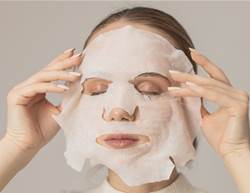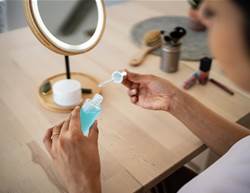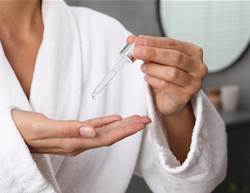Another day, another skincare trend! Hypochlorous acid is the latest buzzworthy addition to skincare routines, especially for those with sensitive or acne-prone skin. It’s said to have calming and healing properties—but is it just another fleeting trend, or does it actually deliver results?
While there’s no shortage of serums and creams promising flawless skin, dermatologists say this simple, science-backed solution might be worth the hype. Here’s what you need to know about hypochlorous acid, how it benefits the skin, and the best ways to use it.
What is hypochlorous acid?
Hypochlorous acid (HOCl) is a naturally occurring compound produced by white blood cells to fight infection and inflammation, says board-certified dermatologist Mona Gohara. “In skincare, it’s used for its antimicrobial and soothing properties to help cleanse and calm the skin.”
Acting as a mild antiseptic and anti-inflammatory agent, hypochlorous acid helps kill harmful bacteria and reduce skin irritation, says board-certified dermatologist Azadeh Shirazi. “It supports the skin’s natural healing process, even in those with sensitive or easily irritated skin.”
Another bonus? It’s considered environmentally friendly, as it doesn’t rely on synthetic chemicals to be effective, she explains.
The compound works in a similar way to bleach in that it kills microbes, says board-certified dermatologist Hadley King. “But it’s not bleach and won’t damage clothing or fabrics,” she clarifies.
How can hypochlorous acid benefit skin?
Its ability to kill harmful bacteria while keeping the skin barrier intact makes it a gentle yet effective option for a wide range of skin concerns, says board-certified dermatologist Dr Castilla, “When used in the correct concentrations in skincare products, it is considered safe and beneficial, even for sensitive or compromised skin.”
How is hypochlorous acid used?
The two main ways hypochlorous acid is found in skin care are in washes or sprays, says Dr. Castilla. “A hypochlorous acid wash can be substituted for your routine cleanser while a spray can be incorporated as the second step in a skin care routine, following cleansing to serve as an alternative to a toner.”
According to Dr. Gohara, here are a few ways you can use hypochlorous acid:
- Spray: Apply a hypochlorous acid facial spray after cleansing as a calming and hydrating toner. It can be used throughout the day for a refresh.
- Spot treatment: Use it directly on blemishes to help reduce bacteria and inflammation.
- For wound care: Apply to minor cuts and abrasions to promote healing and prevent infection.
And if you are curious about how to incorporate this new product into your previously established skincare routine, Dr. Gohara has some tips for you there, too. Here’s how:
- Daily skincare step: After cleansing, spritz on a hypochlorous acid mist and follow up with moisturiser.
- On-the-go soothing: Keep a spray bottle handy to calm irritation from masks or after a workout if you aren’t able to wash your face right away.
- Pairing with other products: It works well with most skincare ingredients but should be applied before occlusive products like moisturisers to ensure maximum absorption.
For best results, Dr Shirazi advises avoiding hypochlorous acid with strong exfoliants—such as lactic acid, glycolic acid and salicylic acid—as this could increase the risk of irritation.
Side effects of using hypochlorous acid on skin
Hypochlorous acid is gentle, but too much of a good thing can lead to issues, says Dr Shirazi. “Overuse can disrupt the skin’s natural microclimate and cause irritation.” Some formulations also contain added preservatives or sensitising ingredients, which could increase the risk of irritation. It’s best to choose a formula with the right concentration for your specific needs, she says. “I favour lines like Skin Smart’s hypochlorous acid sprays, which offer different formulations for different uses,” Dr Shirazi recommends.
Most people tolerate hypochlorous acid well, agrees Dr Gohara. “However, those with extremely sensitive skin should perform a patch test first,” she suggests.
Storage also plays a role in maintaining effectiveness. “Hypochlorous acid products can degrade over time and lose their potency if not stored correctly,” says Dr Gohara. She recommends keeping them in a cool, dark place and limiting exposure to air. Products should be used within 12 months of opening and any unused portion should be discarded after this period.
Is hypochlorous acid safe for skin?
Yes! Hypochlorous acid is generally safe for all skin types, says Dr Shirazi. “I recommend it because of its gentle nature and safety profile, particularly for reducing microorganisms on the skin’s surface in people with conditions like eczema or acne, where the skin barrier is compromised.”
Unlike alcohol, which can be drying, or benzoyl peroxide, which can be irritating, hypochlorous acid is non-toxic and well tolerated, explains Dr King. Its mild yet effective properties make it a popular ingredient in facial sprays, wound cleansers and skincare for sensitive skin, adds Dr Gohara.




.jpg&h=90&w=90&c=1&s=1)

.jpg&h=193&w=250&c=1&s=1)



